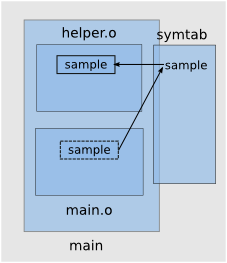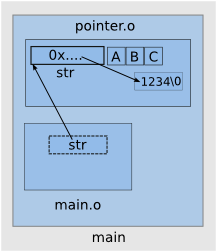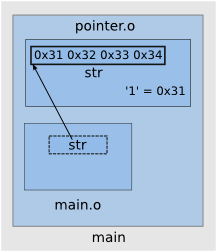The idea for this post came from Virgil’s comment on char[] versus char* entry. We will dig into some of C’s extern keyword internals by means of examples and then analyze the differences between extern char* and extern char[].
extern is a storage class specifier, indicating that the actual storage of a variable or the definition of a function is located elsewhere, typically in another source file.

Let’s start with a simple example:
helper.c
int sample = 42; /* definition */main.c
extern int sample; /* declaration */
int main(void)
{
printf("sample = %d\n", sample);
}Having obtained the corresponding object files helper.o and main.o we link them together into an executable named main. We will use the nm tool to check the symbols from each object file:
$ nm helper.o
00000000 D sample
$ nm main.o
U sample
00000000 T mainNotice that the symbol sample is only declared in main.c but not defined there. In the linking phase, the linker searches through all linked object files and finds out that the actual storage for sample is defined in helper.c. As a result our main executable will print value 42 declared in helper.c external file:
$./main
sample = 42Now let’s see how the compiler behaves if the types for cross-referenced variables do not match:
foo.c
char *foo = "Hello";main.c
void foo(void);
int main(void)
{
foo();
return 0;
}$ gcc -Wall -c foo.c -o foo.o
$ gcc -Wall -c main.c -o main.o
$ gcc -o main main.o foo.o
$ ./main
Segmentation faultFunctions are by default extern, hence the declaration of symbol foo in main.c file allows the compiler to create main.o object file without errors or warnings.
Anyhow, the linker does not check the type of symbol foo; thus, running the main executable results in a function call into an non-executable memory area.
Finally, let’s analyze if we can use a pointer and an array interchangeably between 2 source files.
First try
The file main.c declares an extern array of chars, leaving it to the linker to find the actual storage area defined for it. File pointer.c defines a pointer to a memory area holding a string literal. At link time, the symbol str from main.c is bound to a memory area representing the address of a string.

pointer.c
char *str = "1234";
char a = 'A'; /* memory guards */
char b = 'B';
char c = 'C';main.c
extern char str[];
int main(void)
{
printf("%s\n", str);
return 0;
}By compiling and linking main.c and pointer.c together we get main executable.
$ ./main
\�ABCNotice how the array str is mapped to a memory area where an address is stored. The printf function will display raw data until a \0 is encountered. Fortunately, because of our guarding arrays, printing stops after showing some garbage and string ABC.
Second try
The file main.c declares a pointer to a memory area holding one or more characters. The linker will associate str from main.o with the storage defined by str array from array.o.

array.c
char str[] = "1234";main.c
extern char *str;
int main(void)
{
printf("%s\n", str);
return 0;
}By compiling and linking together these programs we notice that running the main executable results in a crash.
$ ./main
Segmentation faultLet’s use GDB to see the reason:
$gdb ./main
(gdb) b main
Breakpoint 1 at 0x8048385: file main2.c, line 6.
(gdb) run
Breakpoint 1, main () at main2.c:6
6 printf("%s\n", str);
(gdb) p str
$1 = 0x34333231 Address 0x34333231 out of boundsOne can notice that the value of the pointer str is the content of array str. This content is an invalid address dereferenced by the pointer, resulting in the delivery of the dreaded SIGSEGV signal.